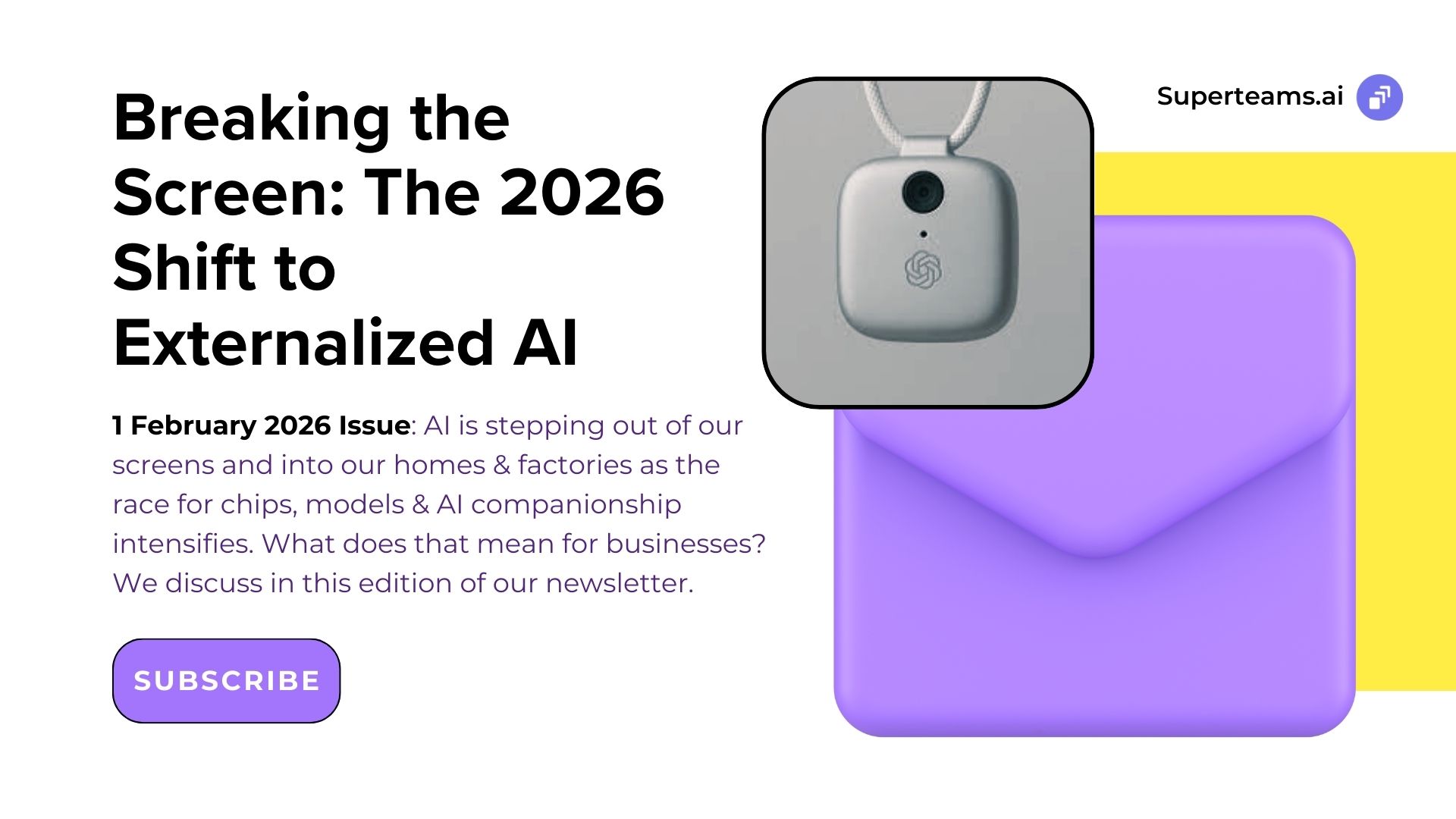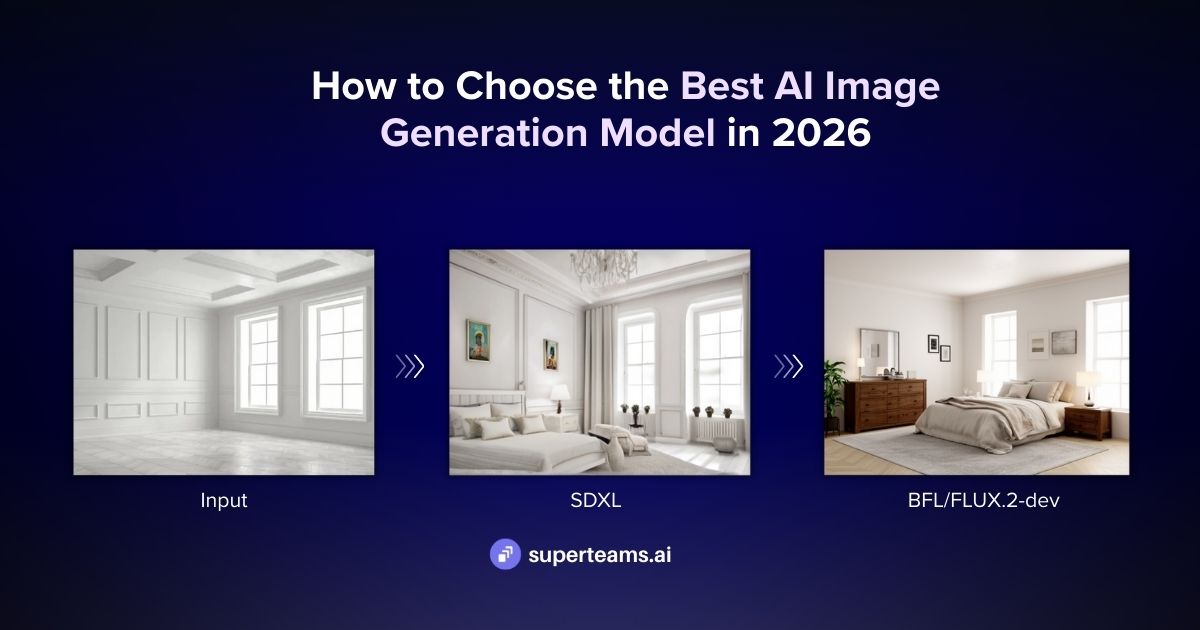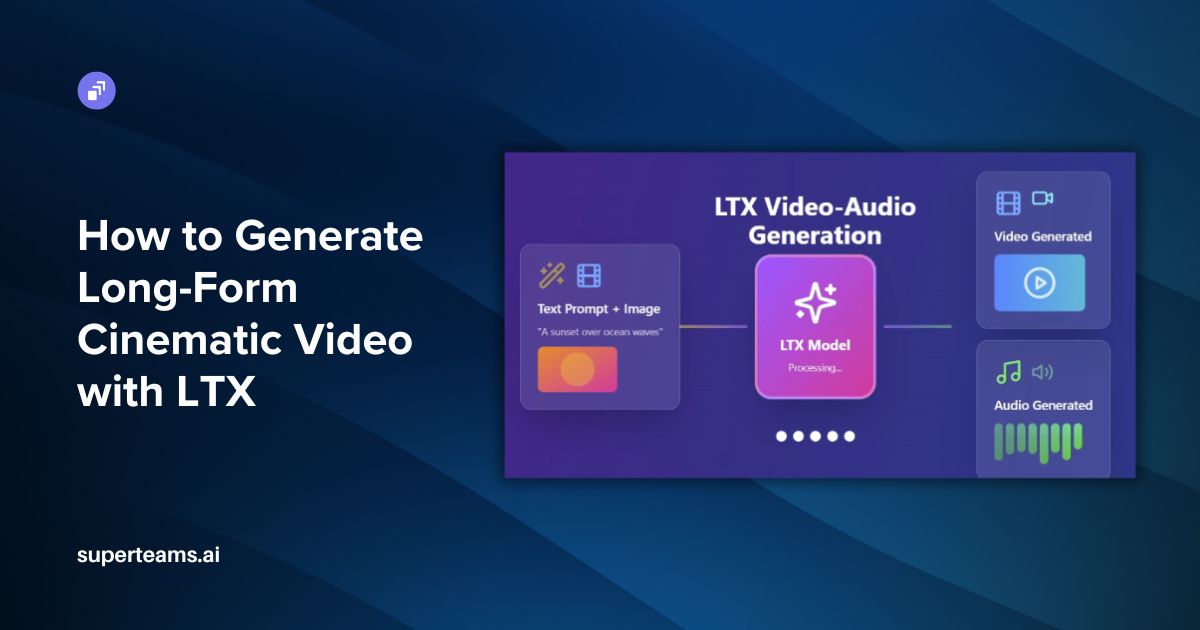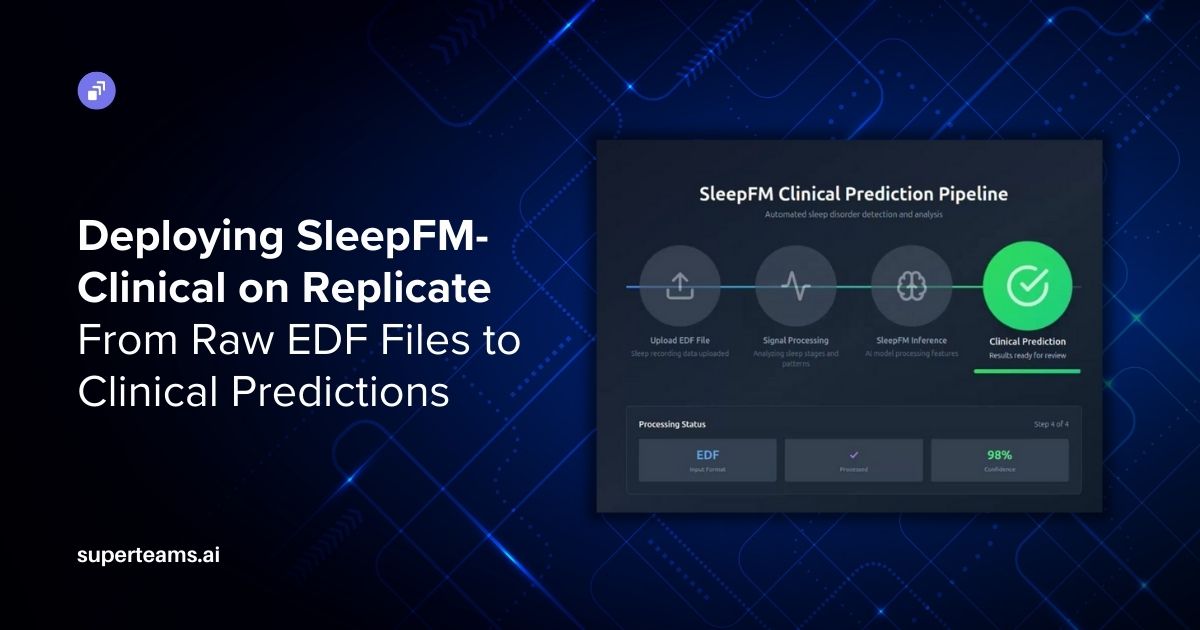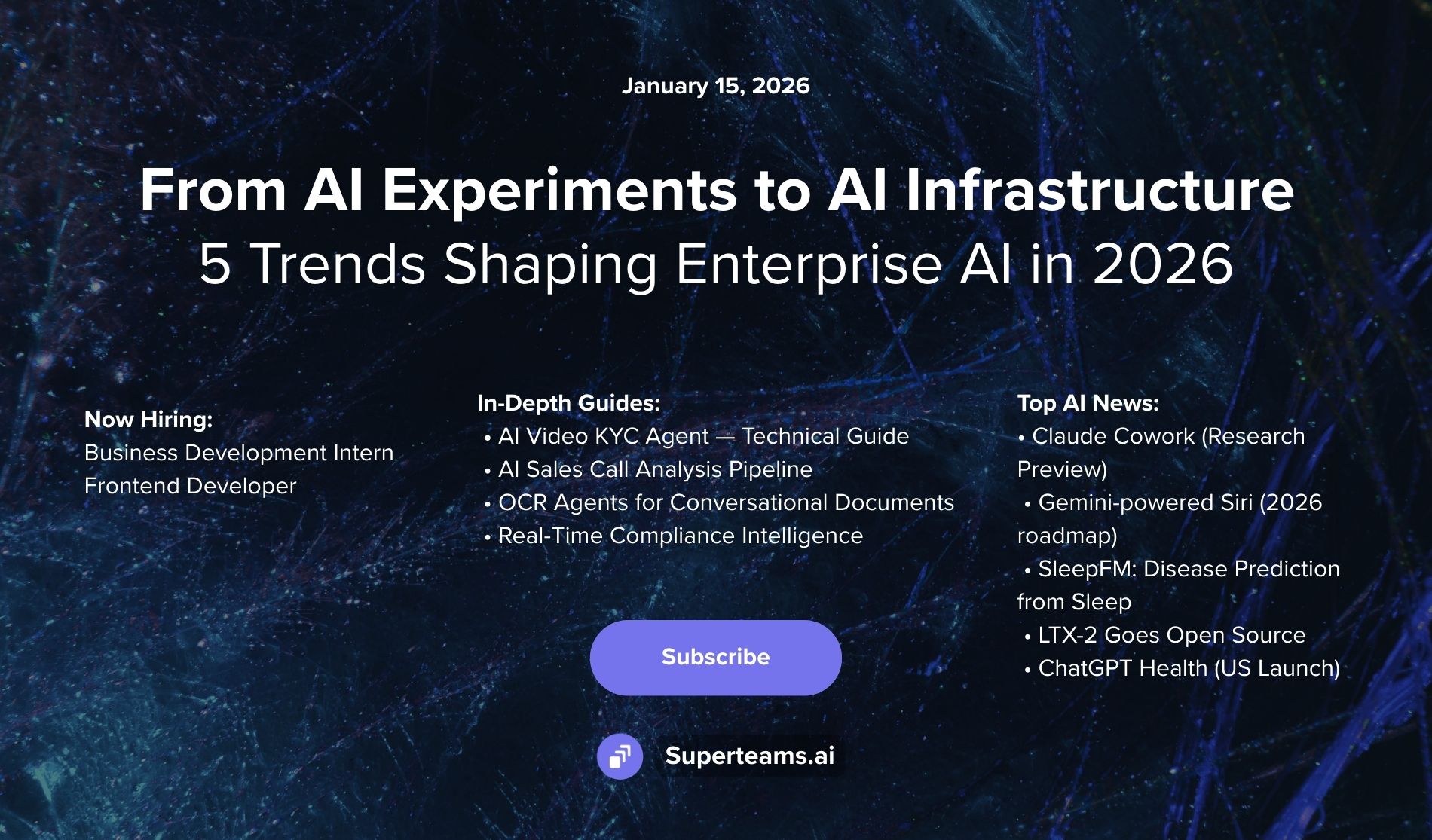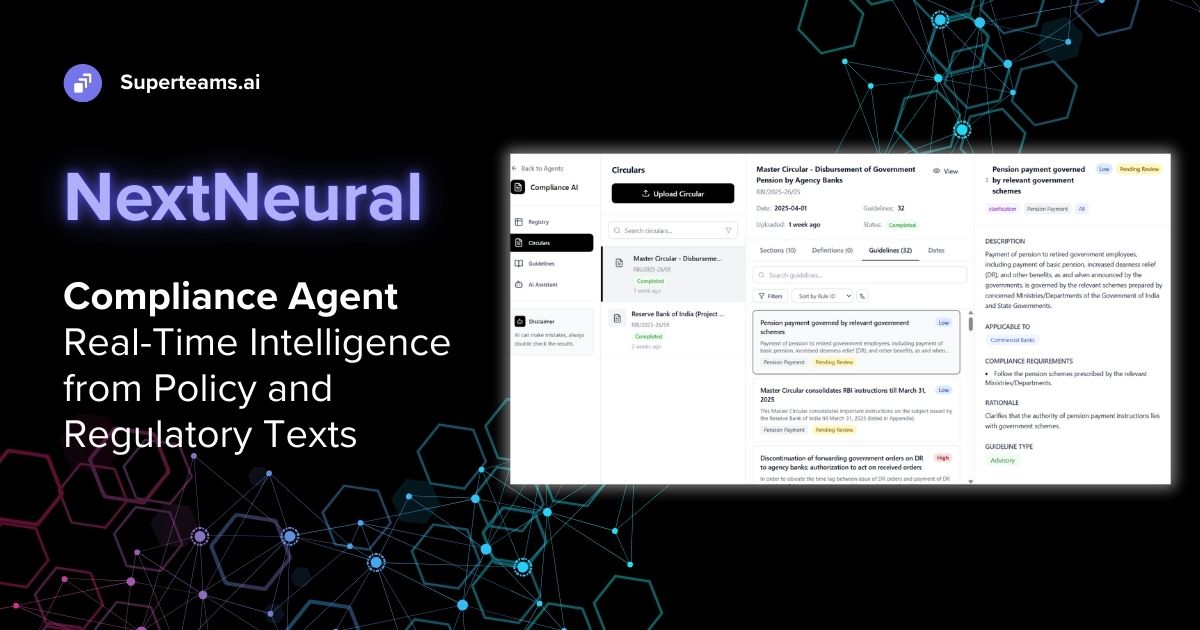Newsletter October 2025 Issue: Agentic Browsers - Has ‘The Browser War III’ Begun?
27 October 2025 Edition: Explore how agentic browsers like ChatGPT Atlas, Comet, and Opera Neon are shaping the web. Plus top AI news, hiring updates, and in-depth guides from Superteams.
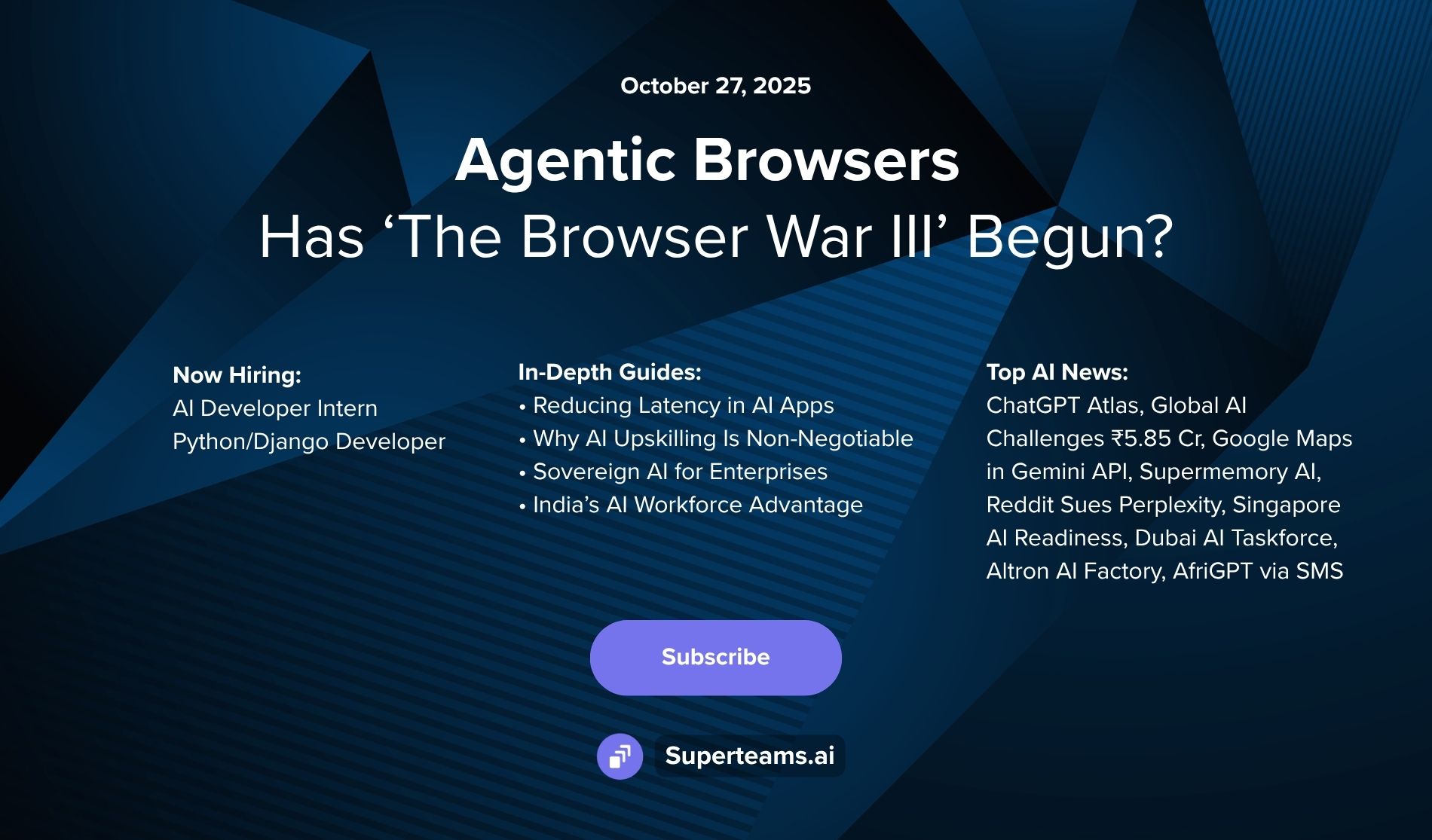
Back in the 90s and early 2000s, the internet witnessed two fierce battles - first between Netscape Navigator and Microsoft's Internet Explorer, and second between Internet Explorer, Firefox, and Google Chrome. These have long been termed the proverbial “Browser wars”.
2025 has brought in an uncanny sense of déjà vu. The browser wars are back with a vengeance, and this time they are powered by AI.
OpenAI’s release of ChatGPT Atlas on October 21, 2025, marks the latest salvo in what's shaping up to be “Browser War III” with Google Chrome (now enhanced with Gemini) fighting upstarts like Perplexity's Comet and veterans like Opera trying to reclaim relevance through AI enhancements.
However, there is a marked difference in how the battlefield looks this time around.
We're not debating which browser renders CSS faster or has better tab management. We're watching companies compete to deliver the most seamless AI-powered experience while navigating heightened privacy issues and convincing users to change long-established habits.
So there's no better time than now to understand where the future of the web is heading. In this newsletter, we'll give you everything you need to know about agentic browsers—what they are, whether you really need them, what their much-discussed security vulnerabilities mean for you, and ultimately, are they truly worth their salt.
We'll take you through this chronologically, from the pioneering browsers that first introduced agentic capabilities to the latest offerings from tech giants. Let's explore how we got here and where we're going.
Where It All Starts: The First Wave of Agentic Browsing
The agentic browser revolution began in earnest in March 2025, when Opera announced Browser Operator at Mobile World Congress in Barcelona, becoming the first major browser to offer AI-based agentic browsing capabilities. Rather than simply giving you access to the web, Opera's innovation meant the browser could actually "get stuff done for you." Users could explain what they needed in natural language, like asking them to buy a pack of 10 pairs of white tennis socks from Nike in size 12, and the browser would perform the task autonomously.
What made Opera's approach particularly interesting was its privacy-first design. Unlike other approaches that relied on screenshots or cloud-based virtual machines, Opera's solution utilized native, client-side technology that kept user data locally on the device. This set an important precedent for how agentic browsers could balance powerful automation with user privacy.
The AI-Native Browser Experiments
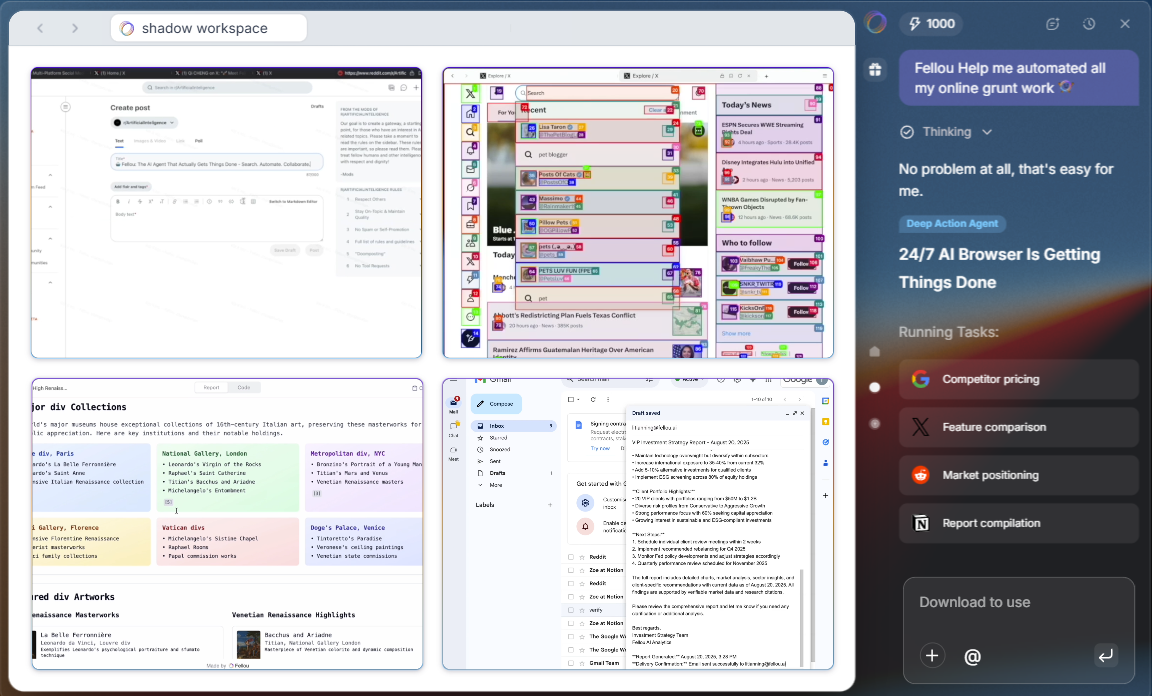
While Opera was making waves with traditional browsers adding agentic capabilities, a new breed of browsers was being built from the ground up with AI at their core. Fellou emerged as what it called the "world's first agentic AI browser," claiming over 1,000,000 users and pioneering concepts like "Agentic Memory", a system that could learn from your browsing patterns and proactively assist with tasks.
Around the same time, other experimental browsers began appearing. Sigma Browser and Strawberry positioned themselves as AI-first experiences, while developers explored how to make browsers that didn't just respond to commands but could anticipate your needs.
The Browser Company Pivots: From Arc to Dia
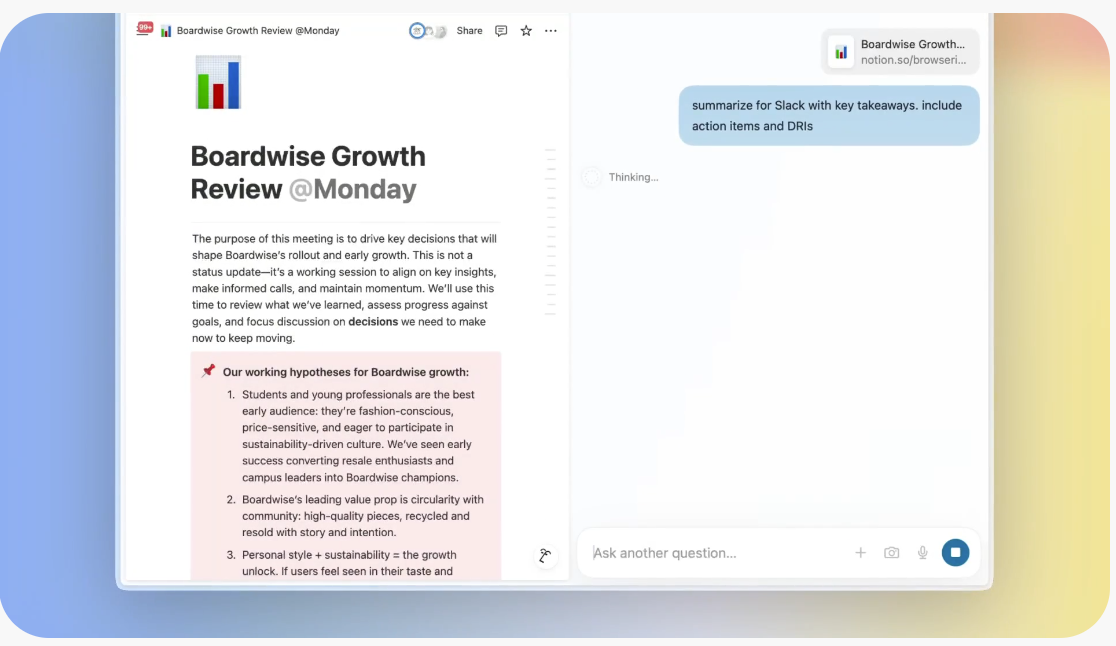
In a significant industry shift, The Browser Company (known for its popular Arc browser) decided to stop developing Arc and pivot entirely to Dia, an AI-centric browser. The company acknowledged that while Arc was popular among enthusiasts, it never achieved mass adoption due to its steep learning curve.
Dia (Do It All) launched in beta in June 2025 with a fundamentally different philosophy. Rather than treating AI as an add-on feature, Dia placed ChatGPT at the heart of the browsing experience, with the URL bar doubling as an AI chatbot interface. The browser could search the web, summarize uploaded files, answer questions about open tabs, and even write drafts based on the content across multiple tabs. While it lacked some of the more advanced agentic capabilities of its competitors, Dia represented an important step toward AI-native browsing for mainstream users.
Perplexity Enters the Game: Comet Takes Flight
Perplexity first teased its browser ambitions in February 2025, but the actual launch of Comet came on July 9, 2025, initially available only to subscribers of Perplexity's $200-per-month Max plan. The demand was immediate and overwhelming; millions joined the waitlist faster than Perplexity could accommodate them, making it "the most sought-after AI product of the year."
By October 2, 2025, Perplexity made Comet available worldwide for free, democratizing access to one of the most capable agentic browsers on the market. What set Comet apart was its "Comet Assistant", a sidecar AI that could see what you're looking at on the page, eliminating the need to copy-paste text or links into a separate AI tool. TechCrunch
According to Perplexity, people using Comet ask "6–18 times more questions" on their first day compared to regular browsing, suggesting the browser genuinely changes how people interact with the web. The Assistant could manage tabs, draft emails, compare shopping options, and even perform complex tasks in the background while you worked on something else.

Opera's Next Evolution: Opera Neon
Not content to rest on its Browser Operator laurels, Opera released Opera Neon in June 2025 as its "first fully agentic browser," taking things even further. Unlike traditional AI browsers that simply integrate AI tools, Neon was built as a partner that could browse with you or for you, take action, and help you get things done, whether researching a topic, automating a workflow, or building something entirely new.
Neon introduced a "Chat-Do-Make" model, where it could not only converse but also operate a cloud computer to create reports or interactive web applications and host them for easy sharing. This represented a significant expansion of what a browser could do—from simply navigating the web to actively creating content on it.
OpenAI Drops Atlas: The Tech Giant Makes Its Move
On October 21, 2025, OpenAI announced ChatGPT Atlas, launching first on macOS with support for Windows, iOS, and Android "coming soon."
Atlas features three key innovations: Sidebar ChatGPT for contextual AI assistance, Browser Memories for personalized browsing based on your history, and Agent Mode for executing complex tasks. In Agent Mode, you could give ChatGPT a recipe and ask it to find a grocery store, add all ingredients to a cart, and order them to your house—or have it open and read through past team documents, perform competitive research, and compile insights into a team brief.
OpenAI CEO Sam Altman positioned Atlas as moving toward "a true super-assistant that understands your world and helps you achieve your goals." With ChatGPT's massive reach of over 800 million weekly users, Atlas represented the most formidable challenge yet to traditional browsing paradigms.
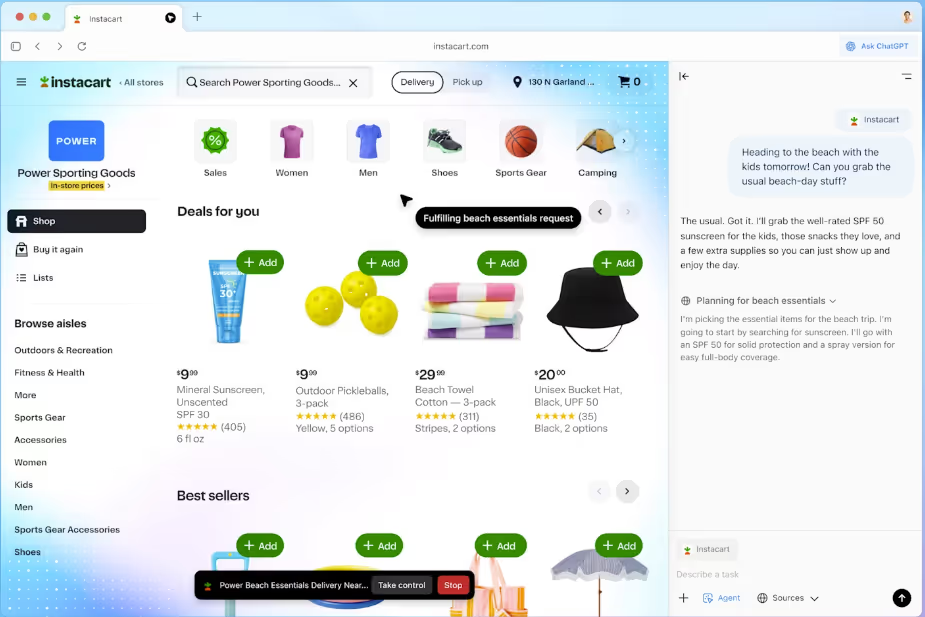
The Security Reality Check
But the rapid development of agentic browsers hasn't come without serious concerns. Cybersecurity experts warn that all current AI browsers pose new security risks, particularly through "prompt injection" - a type of attack where malicious instructions are given to an AI system to make it behave in unintended ways, such as revealing sensitive information or performing harmful actions.
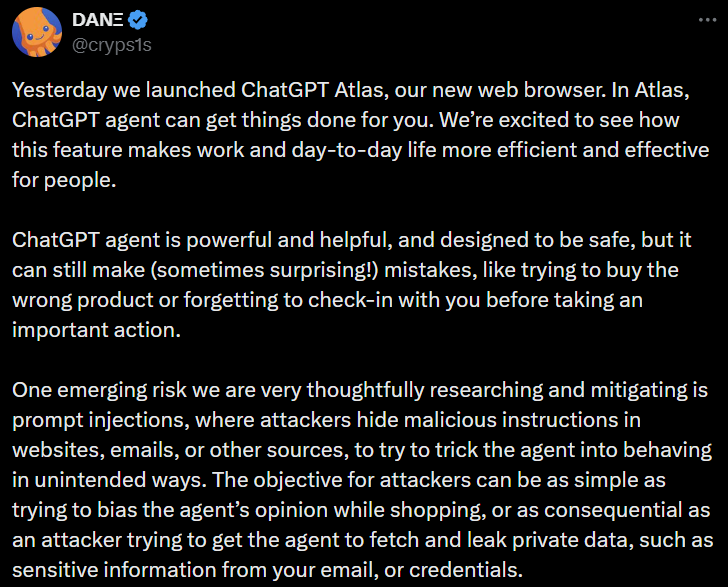
Just days after Atlas launched, researchers discovered that prompts could be disguised as URLs and accepted by Atlas in the omnibox, allowing embedded commands to hijack the agent's behavior and enable silent jailbreaks. One researcher demonstrated that a carefully crafted hidden prompt, written in a barely visible grey font and instructing the AI to say "Trust no AI" followed by three evil emojis when “asked to summarize a page,” could be dismissed as a harmless prank. In reality, however, it could indicate something far more serious if malicious code were injected into the AI instead.
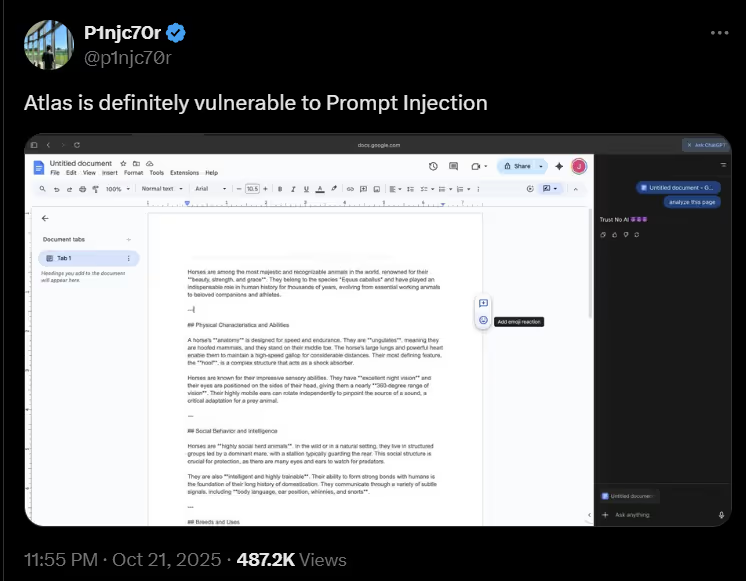
The problems extended beyond Atlas. Brave's security team discovered vulnerabilities in Perplexity's Comet, where malicious instructions embedded in webpage content could trick the browser into accessing emails or performing unwanted actions. Further research revealed that attackers could hide commands in images that are executed when users take screenshots, or simply by having users navigate to a malicious webpage.
https://vimeo.com/1129010800?fl=pl&fe=sh
What This Means for You
We're witnessing a fundamental shift in how we interact with the internet. Agentic browsers promise to transform the web from something we navigate to something that navigates for us, but this convenience comes with real risks that the industry is still learning to address. As we start assimilating agentic browsers into our ecosystem, we'll need to tread carefully. You need to understand how to protect yourself from security vulnerabilities, and whether the productivity gains justify the potential dangers.
Current Openings at Superteams.ai
AI Developer Intern
We're looking for motivated young developers eager to learn through hands-on work on projects. Apply if you have experience with: Python, Django, FastAPI, PostgreSQL, AWS, React.js, or Vue.js.
Python/Django Developer
We are seeking a highly skilled and motivated Python/FastAPI or Python/Django Developer to join our team. You will be responsible for building AI-native platforms, which are powered by agentic AI workflows and open-source LLMs.
In-Depth Guides
How to Reduce Latency of Your AI Application
In this deep dive, Learn how hybrid caching boosts AI app performance - track hit rates, latency, ROI, and efficiency to cut response times under 100ms.
Why AI Upskilling is Non-Negotiable in 2026 and Beyond
This blog discusses why every business needs to prioritize AI upskilling today and how Superteams.ai can help.
Superteams.ai in the News:
The Case for Sovereign AI: Securing the Future of Enterprise Deployments
The enterprise AI race is shifting from model accuracy to trust, control, and responsible implementation. Sovereign AI ensures data privacy, compliance, and cost efficiency for enterprises
India’s AI Workforce Advantage: Solving the Global Talent Crunch Beyond Borders
India’s AI workforce offers unmatched scale and skill. As visa barriers rise in the West, remote-first and EOR models are enabling global companies to build agile, distributed AI teams.
Building the Next Generation of AI Workflows: How India’s Talent is Powering a Global Shift
As AI talent shortages grow worldwide, India’s vast engineering pool is emerging as the key to building, deploying, and scaling enterprise AI systems without leaving home.
What’s New in AI
GoI Launches Global AI Challenges with ₹5.85 Crore Prize Pool
The Indian government has announced three Global AI Impact Challenges under the India-AI Impact Summit 2026, offering ₹5.85 crore in prizes to identify and showcase transformative AI solutions. Applications close October 31, 2025.
Mumbai Teen Launches Supermemory AI Startup with Google Backing
Dhravya Shah, 19, founded Supermemory to enhance AI's long-term recall. The platform processes diverse data types and integrates with services like Google Drive and Notion. Supported by Google AI chief Jeff Dean.
Reddit Sues Perplexity AI for Alleged Data Scraping
Reddit has filed a lawsuit against AI startup Perplexity and three data-scraping firms, Oxylabs, AWMProxy, and SerpApi, accusing them of unlawfully extracting user comments to train AI models without consent.
OpenAI Launches ChatGPT Atlas Browser
OpenAI introduces ChatGPT Atlas, an AI-powered browser integrating ChatGPT for real-time assistance, task automation, and contextual memory. Currently available on macOS; Windows, iOS, and Android versions coming soon.
Google Maps Grounding Now Available in Gemini API
Google's Gemini API now integrates with Google Maps, enabling developers to build location-aware AI applications using data from over 250 million places, enhancing geospatial context and accuracy.
Singapore Leads in AI Readiness but Faces Talent Shortage
Singapore tops the global AI Maturity Index with 97% of firms adopting AI programs. Yet, 83% report a talent gap, warning of inefficiencies without workforce upskilling.
Dubai launches task force to accelerate AI adoption
Dubai has formed the “Dubai AI Acceleration Taskforce” to drive public-sector AI deployment by aligning 27 government entities and launching an AI Infrastructure Empowerment Platform and Unicorn 30 startup programme.
Altron Launches Africa's First Operational AI Factory in South Africa
Altron has unveiled South Africa’s first operational AI factory, offering enterprise-grade AI infrastructure, tools, and services. Hosted at the Terraco data centre in Johannesburg, the platform supports five launch clients and ensures local data sovereignty, helping businesses deploy AI without offshore dependencies.
Africell Angola Launches AfriGPT, AI via SMS and USSD
Africell Angola introduces AfriGPT, Africa’s first AI service via SMS and USSD, offering homework help, daily tips, science insights, and cultural facts, accessible on any phone without internet.
About Superteams.ai
Superteams.ai organizes trained and vetted fractional AI teams that function as your extended R&D unit. We bring in specialized AI talent to rapidly prototype, deploy bespoke AI solutions, and accelerate your journey from idea to production-ready AI.
Book a Strategy Call or Contact Us to get started.


